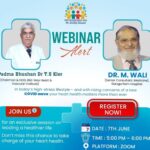“Women should not ignore common symptoms, particularly palpitations”
New Delhi, April 12, 2018:
Menopause can increase the risk of developing cardiovascular diseases, according to a recent study. The transition to menopause in women is marked by other health effects as well, including hot flashes and depression to vascular aging, which is typically seen as artery stiffening and endothelial dysfunction. As the estrogen levels fluctuate and decline during this time, it becomes imperative to monitor vitals parameters in women.
More than one in three female adults has some form of cardiovascular disease. An overall increase in heart attacks among women is seen about 10 years after menopause. Heart disease is the leading killer in women although it is traditionally thought to be a man’s problem.
Speaking about this, Padma Shri Awardee Dr K K Aggarwal, President Heart Care Foundation of India (HCFI) and Immediate Past National President Indian Medical Association (IMA), said, “The hormone estrogen helps to protect different parts of a woman’s body, including the heart and blood vessels. A low level of estrogen before menopause is a significant risk factor for developing microvascular disease. Though women will often have some chest pain or discomfort, it may not be the most prominent symptom. Diffuse plaques build-up and diseased smaller arteries are two reasons why symptoms can be different in women. Some women who are going through menopause may be more aware of their heart beating (palpitations). In such cases, it is important to get a check up at the earliest to rule out any possibilities.”
In addition to chest pain, pressure or discomfort, signs and symptoms of heart attack in women include neck, shoulder, upper back or abdominal discomfort, shortness of breath, nausea or vomiting, sweating, light-headedness or dizziness and unusual fatigue.
Adding further, Dr Aggarwal, who is also the Group Editor of IJCP, said, “Women should take care of their heart through regular exercise and good nutrition and by eliminating unhealthy habits like smoking, which may contribute to early menopause, increase the risk of blood clots, decrease the flexibility of arteries and lower the levels of HDL cholesterol.”
HCFI tips for all women
- Moderate intensity physical activity for at least 30 minutes and for 60 to 90 minutes for weight management on most days of the week.
- Avoidance and cessation of cigarette smoking and passive smoking
- Keep waist circumference below 30 inches.
- Take a heart-friendly diet. Include omega-3 fatty acids in diet.
- Keep blood sugar, ‘bad’ LDL cholesterol and blood pressure (BP) under control.
- In women older than 65 years of age, daily aspirin may be considered in consultation with the doctor.
- Women who smoke should avoid oral contraceptive pills.
- Treat underlying depression.
For women at high risk
- Aspirin 75 to 150 mg, as prevention
- Control of high blood pressure.
- No use of antioxidant vitamin supplement.
- No use of folic acid support.
- No Hormone Replacement Therapy.
- Lowering of LDL ‘bad’ cholesterol to less than 80.







